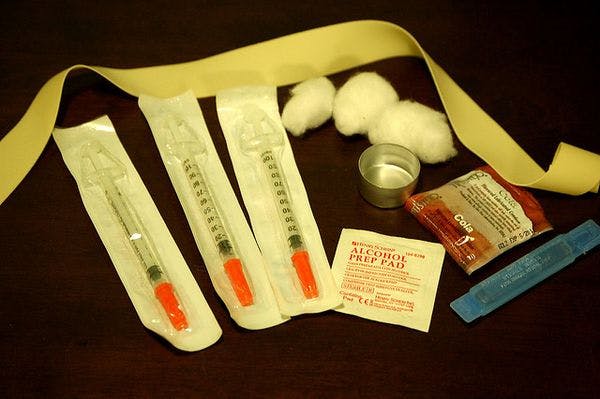El Congreso estadounidense levanta finalmente la prohibición sobre los programas de intercambio de agujas con fondos federales
Por iniciativa de dos republicanos de Kentucky, el Congreso estadounidense levantó “parcialmante” —pero de forma efectiva— la prohibición que pesaba sobre la asignación de fondos federales a programas de intercambio de agujas, que se despliegan para luchar contra la propagación del VIH y la tuberculosis. Más información, en inglés, está disponible abajo.
Suscríbase a las Alertas mensuales del IDPC para recibir información sobre cuestiones relacionadas con políticas sobre drogas.
In the waning days of 2015, congressional Republicans agreed to essentially end their decades-long opposition to federally funding state and local needle exchange programs, slipping a repeal of the ban into the end of the year omnibus spending measure with virtually no fanfare.
The decision — purportedly spearheaded by House Appropriations Chairman Hal Rogers and backed by Senate Majority Leader Mitch McConnell, both from Kentucky, as well as West Virginia Republican Sen. Shelley Moore Capito, who is on the Appropriations Committee — came in response to a massive HIV/AIDS outbreak in Indiana, as well as their home state’s decision to implement its own exchange to combat growing heroin use.
Rogers and Capito spokespeople did not return requests for comment, but a McConnell aide acknowledged that Rogers pushed for it and that McConnell ensured the language got in the bill.
“If you’d spoken to me at the beginning of last year, I’d have said we’re playing the long game, can we even identify a single Republican to champion this,” said Michael Collins, Deputy Director of the Drug Policy Alliance.
HIV/AIDS experts and activists hailed the decision. The “partial” repeal passed by Congress in late December will allow exchange programs to pay for “staff, the vans, the gas, rent, everything but the syringes. It’s basically a giant work around” to conservative opposition to needle exchanges, said Dr. Steffanie Strathdee, Associate Dean of Global Health Sciences at the University of California at San Diego.
Click here to read the full article.
Keep up-to-date with drug policy developments by subscribing to the IDPC Monthly Alert.
Thumbnail: Flickr Todd Huffman
